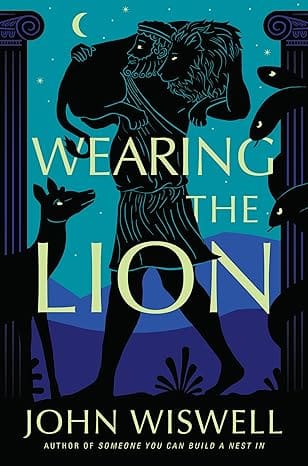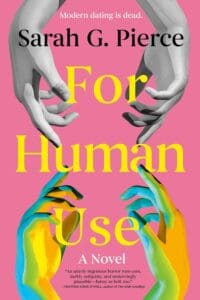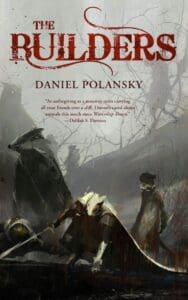
Synopsis
This second novel from Nebula Award-winning John Wiswell brings a humanizing, redemptive touch to the Hercules story in this mythological fantasy for fans of Jennifer Saint and Elodie Harper
Heracles, hero of Greece, dedicates all his feats to Hera, goddess of family. Heracles’ mother raised him to revere Hera, as her attempt to avoid the goddess’ wrath. Unbeknownst to Heracles, he is yet another child Hera’s husband, Zeus, had out of wedlock.
Hera loathes every minute of Heracles’ devotion. She finally snaps and sends the Furies to make Heracles kill himself. But the moment Heracles goes mad, his children playfully ambush him, and he slays them instead. When the madness fades, Heracles’s wife, Megara, convinces him to seek revenge. Together they’ll hunt the Furies and learn which god did this.
Believing Hera is the only god he can still trust, Heracles prays to Hera, who is wracked with guilt over killing his children. To mislead Heracles, Hera sends him on monster-slaying quests, but he is too traumatized to enact more violence. Instead, Heracles cares for the Nemean lion, cures the illness of the Lernaean hydra, and bonds with Crete’s giant bull.
Hera struggles with her role in Heracles life as Heracles begins to heal psychologically by connecting with the monsters—while also amassing an army that could lay siege to Olympos.
Nebula Award-winning author John Wiswell brings his signature humanizing touch to the Hercules story, forever changing the way we understand the man behind the myth—and the goddess reluctantly bound to him.
Review
Recently I read John Wiswell’s debut novel Someone You Can Build A Nest In. I really liked the atypical romance story and found myself vibing a lot with Wiswell’s humor throughout the story.
If I just “liked” his first novel, I was enraptured by his new book, Wearing the Lion, an inspired take on the ancient Greek tale of Heracles and his Twelve Labors. I was captivated by the reimagining of the classic mythology, laughing throughout at Wiswell’s humor, while at the same time being reduced to tears by the tragedy (and ultimate character redemption) that unfolds with each page.
Wearing the Lion doesn’t come out until June 17, but I just loved this book so much, I wanted to get the word out sooner than later.
So…strap in…in honor of Heracles’ 12 Labors and the 12 Olympian Gods of Greece, the rambling remainder of this review will be contained in 12 points (slight spoilers ahead for the retelling of a 2,500 year old story)….
- OK…let’s talk Disney, or just American sensibilities. I teach history to junior high and high school students and have done more than my share of Ancient Greece and the Pantheon of Gods and Goddesses. One thing that absolutely drives me nuts (and I tell my students every year) is the American obsession with binary choices. Coke or Pepsi. Black or White. Republican or Democrat. Star Trek or Star Wars. Those binary choices have negatively impacted retellings of Greek mythology. Inevitably, we get movies like Disney’s Hercules (the Roman name of our hero, even though the story is almost completely Greek). In the Disney version, Zeus and Hera are happily married and Hercules is their son. The villain of the movie is Hades, all to set up the concept of Hercules = Good and Hades = Bad. In reality, the Greek Pantheon was a convoluted mess that isn’t easily defined by a binary protagonist/antagonist relationship. In Wiswell’s Wearing the Lion, the author really showcases the crazy dynamic of Mount Olympus, showing the machinations of more than just Zeus and Hades. In fact, Hades is barely even mentioned in the entire book. Instead we get a fantastic group of side characters…and I just fell in love with…
- Boar. Well, I did at least. A Boar…man…or perhaps a man who believes himself to be a Boar. When we first meet Boar, his heartbreaking story and how he’s portrayed brought me to tears. His part of the story goes to show how Heracles thinks about the situations he’s put into and at times makes you wonder about…
- Heracles the Himbo? Disney’s version puts our hero on center-stage without a ton of book smarts. In the movie Meg pokes fun at it constantly, but the heroic qualities (and Herc’s looks) seem to offset his mental limitations. In Wiswell’s version, Heracles isn’t portrayed as a “hunk,” even pointing out that his god-given strength is so immense that he can’t work off his gut paunch. And while Wiswell doesn’t make Heracles a Rhodes scholar, he definitely uses inventiveness and wiles to complete his tasks. But throughout most of the novel, he does have a gigantic blindspot when it comes to…
- Hera. When I read about the 12 Labors in school years ago, I always felt like Hera was somewhat justified. Not that it was Heracles’ fault that Zeus cheated on Hera, but it was more than that. This baby is born…this amazing baby fathered by Zeus. And then on top of it all, they name the freakin’ kid after the jilted mother of the gods. And, especially in Wiswell’s version, that name — HERA’S GLORY — leads Heracles to pray to her day after day after day. Was she right in her actions? No…but you can understand it. Which makes for an interesting…
- Framing device. Wiswell alternates chapters between Hera and Heracles throughout. It creates an interesting look at the story through multiple perspectives, often from victim to perpetrator at the same time. It makes the book fly by quicker, but it feels almost required to slow down when tragedy strikes, but Wiswell wisely plays with the standard…
- Narrative. In fact, the ancient Greek narrative isn’t a set canon. When you look back at stories like Heracles in Greece or Gilgamesh in Mesopotamia, there are so many possible plots. Many of these tales were oral in nature and just like any story, changes were made when it was told from one group to another. With variety in his back pocket, Wiswell takes a chisel to the typical plot, letting Hera still drive Heracles to the madness that kills his sons, but leaves his wife Megara alive, but altered — frightened — traumatized. Meg knows it had to be a Olympian, so she is the impetus that drives Heracles on the required…
- Twelve Labors. In the original tradition of Heracles’ labors, it seems almost like a checklist — things that had to be done, regardless of difficulty for his crimes. But in this reimagining, Heracles works through them, not out of an obligation, but with a purpose…retribution. But in his quest for vengeance, he discovers his taste for violence is gone. It makes the Labors less of a chore and more of a quest from one Labor to the next to find answers. Speaking of answers, I’ve just realized…
- Twelve of anything is a lot. I didn’t really think this list through before I started. Wow. And neither did Hera. Her pain from…
- Zeus’ infidelity. His careless indifference to his own wife and family starts everything from the get-go. From there, he is a key to the story, but notably absent from most of the main storyline. In fact, Wiswell cleverly wove historical eras and the eventual displacement of Greece as the center of the modern world as the eventual explanation for Zeus’ disappearance. And it helped explain a huge plot hole in the Heracles original story – namely, why would Zeus even allow his wife to torment his favorite demigod son, not once, but on over a dozen separate occasions? Speaking again of those Labors, Heracles decision to avert violence leads to a wonderful…
- Found family. After killing his sons, Heracles is in a bad place and isn’t looking to replace them…just to avenge them. But in his quest for truth, the Twelve Labors don’t represent subtraction, but Heracles adding to his life by working through his grief. I mentioned Boar (a wonderful character), but he also adds the Nemean Lion (Wiswell may actually be insane for actually letting Heracles name him Purrseus), the Hydra, the Golden Hind, and the Cretan Bull to his crew. Each play a key role in getting him back to a place where he can face his demons and his tormentor. That tormentor again, we just keep coming back to…
- Hera. Heracles is clearly the focus of this story, but there are two redemption arcs here and Hera goes on her own journey as well. In Wearing the Lion, Wiswell keeps the gods fairly consistent, which makes sense. Athena has her key attributes and keeps to those, same as Ares, Aphrodite, Apollo, etc. But that consistent characterization shows how much Hera actually change and evolves over the course of the book. A book which was…
- Excellent. I said it at the beginning, but I can’t help saying it again. Wiswell wrote a divine book in Wearing the Lion, weaving modern sensibilities into an ancient tale in a Mediterranean setting. When Heracles returned home at the end of his journey, Megara’s embrace had me weeping and I don’t know that I’ll forget how I felt in that moment any time soon. If you enjoy retellings of Greek myths or just great books in general, I think you’ll enjoy Wearing the Lion.
Thank you to DAW for providing this book for review consideration via NetGalley. All opinions are my own. Wearing the Lion releases on June 17.










Leave a Reply